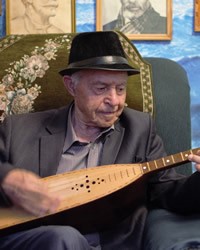Tsudakar in Russia

Photo Source:
Anonymous
|
Send Joshua Project a map of this people group.
|
| People Name: | Tsudakar |
| Country: | Russia |
| 10/40 Window: | No |
| Population: | 20,000 |
| World Population: | 20,000 |
| Primary Language: | Dargwa |
| Primary Religion: | Islam |
| Christian Adherents: | 0.00 % |
| Evangelicals: | 0.00 % |
| Scripture: | Portions |
| Ministry Resources: | Yes |
| Jesus Film: | Yes |
| Audio Recordings: | No |
| People Cluster: | Caucasus |
| Affinity Bloc: | Eurasian Peoples |
| Progress Level: |
|
Introduction / History
Looking for a classy furry hat at a bazaar in Russian cities such as Moscow? Ask around for the Tsudakar Dargin men and before long you will have the hat you are looking for. Throughout Russia Tsudakar men are known as hat makers and sellers. The Russian Empire took over the area where the Tsudakar live in 1864.
The Tsudakar live in central Dagestan at the western edge of the Dargin family of languages in the Caucasus mountains. Many Tsudakar speak Dargwa among themselves and Russian at school and work.
Bible portions and the JESUS Film are available in the Dargwa language. There are no or few known Tsudakar followers of Jesus Christ.
What Are Their Lives Like?
The Tsudakhar people live in eight major towns and many smaller villages in the Russian Republic of Dagestan. They have been devoted Muslims since the 15th century. Islam in central Dagestan is not only a religion; it also is interwoven with the structure of society.
The male council of elders in each village oversees religious behavior and communal decisions. They elders make judicial decisions and enforce the laws of Islam. There is great pride in Islamic identity, but when conflicts emerge there is little tradition of grace and reconciliation.
The Tsudakar who do not make hats often work in agriculture and in animal husbandry. They grow wheat, barley, oats, grapes, and olive trees along with vegetables. Men also herd sheep and goats. They trade hats, surplus grain, oil, wine, and animal products for things that they cannot make for themselves such as cell phones and appliances.
The Tsudakar tend to have large families. Children, especially boys, are seen as blessings of Allah. Sons inherit their father's property. It is common for three generations to live under one roof.
What Are Their Beliefs?
The Tsudakar are Sunni Muslims. Being a Muslim is viewed as part of their personal identity.
Sunni Muslims believe the supreme God, Allah, spoke through his prophet, Mohammed, and taught mankind how to live a righteous life through the Koran and the Hadith. To live a righteous life, you must utter the Shahada (a statement of faith), pray five times a day facing Mecca, fast from sunup to sundown during the month of Ramadan, give alms to the poor, and make a pilgrimage to Mecca if you have the means. Muslims are prohibited from drinking alcohol, eating pork, gambling, stealing, slandering, and making idols. They gather for corporate prayer on Friday afternoons at a mosque, their place of worship.
The two main holidays for Sunni Muslims are Eid al Fitr, the breaking of the monthly fast and Eid al Adha, the celebration of Abraham's willingness to sacrifice his son to Allah.
Sunni religious practices are staid and simple. They believe that Allah has pre-determined our fates; they minimize free will.
What Are Their Needs?
The Tsudakar must understand that Christianity is not a white, European religion. Russian Christians have persecuted the Tsudakar in the past. Jesus Christ died for all peoples. Only through him can the Tsudakar have their sins forgiven and be granted eternal life. The Tsudakar must see the love of Christ shown to them practical ways.
Prayer Points
Pray for the Holy Spirit's blessing on new oral work in Tsudakar. Over 30 Audio Bible stories in Tsudakar are completed along with the Lord's Prayer.
Pray for the Lord to direct upcoming oral Bible translation work for two books of the Bible in Tsudakar.
Pray for grace to flow through these Bible stories and translations.
Ask the Lord to send loving workers to the Tsudakar.
Pray that the Lord creates a hunger to know God in the hearts of the Tsudakar elders.
Pray that the Lord moves Christians in the Caucasus region to share the good news of Christ with the Tsudakar.